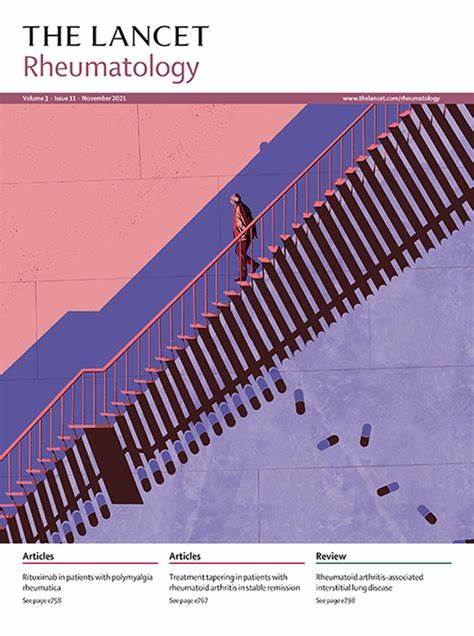Survival in patients with rheumatoid arthritis and recently diagnosed early-stage colorectal, lung, or prostate cancer receiving tumour necrosis factor inhibitors: a retrospective cohort study
IF 15
1区 医学
Q1 RHEUMATOLOGY
引用次数: 0
Abstract
Background
Tumor necrosis factor (TNF) inhibitors could impair tumoural immunity in patients with rheumatoid arthritis and cancer. We aimed to investigate the association between survival and TNF inhibitor treatment during the first 3 years after a diagnosis of colorectal, lung, or prostate cancer in patients with rheumatoid arthritis.
Methods
In this cohort study, we conducted a secondary data analysis of the Surveillance, Epidemiology, and End Results Medicare-linked dataset. We included patients aged 66 years and older with rheumatoid arthritis diagnosed with colorectal, lung, or prostate cancer between Jan 1, 2008, and Dec 31, 2019, using ICD-O-3 site and histology codes. We limited the cohort to patients who had early-stage cancer (localised or regional). We only included patients who received TNF inhibitors, conventional synthetic disease-modifying antirheumatic drugs (DMARDs), or no DMARDs in the first year after cancer diagnosis. The primary outcomes were 5-year overall survival and cancer-specific survival. Exposures were use of TNF inhibitors, conventional synthetic DMARDs, or no DMARDs within 3 years after cancer diagnosis. Other covariates included demographics and comorbidities. We conducted landmark analyses at years 1, 2, and 3, with Cox regression adjusted by propensity scores. People with lived experience of rheumatoid arthritis and cancer were not involved in the design or conduct of this study.
Findings
We identified three cohorts of patients diagnosed with early-stage colorectal cancer (n=514), lung cancer (n=864), or prostate cancer (n=603) between Jan 1, 2008, and Dec 31, 2019. In the colorectal cancer cohort, the mean age was 76·1 years (SD 6·4), 385 (75%) of 514 patients were female, 129 (25%) were male, and 405 (79%) were White and non-Hispanic. In the lung cancer cohort, the mean age was 74·8 years (SD 5·9), 632 (73%) of 864 patients were female, 232 (27%) were male, and 743 (86%) were White and non-Hispanic. In the prostate cancer cohort, the mean age was 73·1 years (SD 5·1), 603 (100%) patients were male, and 492 (82%) were White and non-Hispanic. 80 (16%) of 514 patients with colorectal cancer, 102 (12%) of 864 patients with lung cancer, and 120 (20%) of 603 patients with prostate cancer received TNF inhibitors with or without conventional synthetic DMARDs at any time during the first year after cancer diagnosis. No significant deleterious association was observed for overall survival or cancer-specific survival for any of the cancers at any of the three landmark points. Hazard ratios and 95% CIs for overall survival for year 1 comparing TNF inhibitors with conventional synthetic DMARDs in the three cohorts were 0·72 (0·43–1·21) for colorectal cancer, 0·70 (0·49–1·00) for lung cancer, and 0·80 (0·44–1·44) for prostate cancer. Patients who received glucocorticoids in the first year had significantly worse overall survival and cancer-specific survival than those who did not in the multivariable Cox proportional hazards models for the three cancers.
Interpretation
Treatment with TNF inhibitors during the first 3 years after diagnosis of colorectal, lung, or prostate cancer was not associated with poorer survival compared with those who received conventional synthetic DMARDs or those who did not receive any DMARDs. However, these findings might not be generalisable to other populations or types of cancer.
Funding
National Institutes of Health (NIH)/National Institute of Arthritis and Musculoskeletal and Skin Diseases and NIH/National Cancer Institute through MD Andeson's Cancer Center Support Grant and Komen.
接受肿瘤坏死因子抑制剂治疗的类风湿关节炎和新近确诊的早期结直肠癌、肺癌或前列腺癌患者的生存率:一项回顾性队列研究
背景:肿瘤坏死因子(TNF)抑制剂可损害类风湿关节炎和癌症患者的肿瘤免疫。我们的目的是研究类风湿关节炎患者在诊断为结直肠癌、肺癌或前列腺癌后的前3年生存率与TNF抑制剂治疗之间的关系。方法:在这项队列研究中,我们对监测、流行病学和最终结果医疗保险相关数据集进行了二次数据分析。我们纳入了2008年1月1日至2019年12月31日期间诊断为结直肠癌、肺癌或前列腺癌的66岁及以上类风湿关节炎患者,使用ICD-O-3位点和组织学编码。我们将队列限制为患有早期癌症(局部或区域性)的患者。我们只纳入了在癌症诊断后一年内接受TNF抑制剂、常规合成疾病缓解抗风湿药物(DMARDs)或未接受DMARDs治疗的患者。主要结局是5年总生存期和癌症特异性生存期。暴露于使用TNF抑制剂,常规合成dmard,或在癌症诊断后3年内不使用dmard。其他协变量包括人口统计学和合并症。我们在第1年、第2年和第3年进行了具有里程碑意义的分析,并通过倾向得分调整了Cox回归。有类风湿关节炎和癌症生活经验的人没有参与这项研究的设计或实施。研究结果:在2008年1月1日至2019年12月31日期间,我们确定了三组诊断为早期结直肠癌(n=514)、肺癌(n=864)或前列腺癌(n=603)的患者。在结直肠癌队列中,平均年龄为71.6岁(标准差为6.4),514例患者中女性385例(75%),男性129例(25%),白人和非西班牙裔405例(79%)。在肺癌队列中,平均年龄为78.4岁(标准差为5.9),864例患者中有632例(73%)为女性,232例(27%)为男性,743例(86%)为白人和非西班牙裔。在前列腺癌队列中,平均年龄为73.1岁(标准差为5.1),603例(100%)为男性,492例(82%)为白人和非西班牙裔。514例结直肠癌患者中有80例(16%),864例肺癌患者中有102例(12%),603例前列腺癌患者中有120例(20%)在癌症诊断后的第一年的任何时间接受了TNF抑制剂联合或不联合常规合成DMARDs。在三个里程碑点上,没有观察到任何癌症的总生存期或癌症特异性生存期有显著的有害关联。在三个队列中,比较TNF抑制剂与常规合成dmard的1年总生存率的风险比和95% ci分别为:结直肠癌0.72(0.43 - 1.21),肺癌0.70(0.49 - 1.00),前列腺癌0.80(0.44 - 1.44)。在三种癌症的多变量Cox比例风险模型中,第一年接受糖皮质激素治疗的患者的总生存率和癌症特异性生存率明显低于未接受糖皮质激素治疗的患者。解释:在结直肠癌、肺癌或前列腺癌诊断后的前3年内,与接受常规合成DMARDs或未接受任何DMARDs的患者相比,接受TNF抑制剂治疗与较差的生存率无关。然而,这些发现可能不适用于其他人群或癌症类型。资助:美国国立卫生研究院(NIH)/国家关节炎、肌肉骨骼和皮肤疾病研究所和美国国立卫生研究院/国家癌症研究所,通过MD安德森癌症中心支持基金和科曼。
本文章由计算机程序翻译,如有差异,请以英文原文为准。
求助全文
约1分钟内获得全文
求助全文
来源期刊

Lancet Rheumatology
RHEUMATOLOGY-
CiteScore
34.70
自引率
3.10%
发文量
279
期刊介绍:
The Lancet Rheumatology, an independent journal, is dedicated to publishing content relevant to rheumatology specialists worldwide. It focuses on studies that advance clinical practice, challenge existing norms, and advocate for changes in health policy. The journal covers clinical research, particularly clinical trials, expert reviews, and thought-provoking commentary on the diagnosis, classification, management, and prevention of rheumatic diseases, including arthritis, musculoskeletal disorders, connective tissue diseases, and immune system disorders. Additionally, it publishes high-quality translational studies supported by robust clinical data, prioritizing those that identify potential new therapeutic targets, advance precision medicine efforts, or directly contribute to future clinical trials.
With its strong clinical orientation, The Lancet Rheumatology serves as an independent voice for the rheumatology community, advocating strongly for the enhancement of patients' lives affected by rheumatic diseases worldwide.
 求助内容:
求助内容: 应助结果提醒方式:
应助结果提醒方式:


